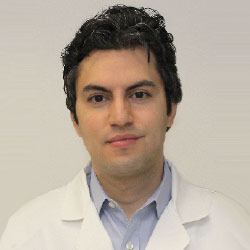Funds to support cutting-edge immunotherapy trial for pediatric high-grade glioma
Bethesda, MD – February 8, 2020 – CureSearch for Children’s Cancer has received a $1 million gift from the Norcross Family Foundation in support of a first-in-human, phase I/II clinical trial testing an innovative personalized immunotherapy for pediatric high-grade gliomas, the primary cause of death in children with brain tumors.
The project is funded through a CureSearch Catapult Award granted to pediatric oncologist Elias Sayour, MD, PhD at the University of Florida who will partner with the Pacific Pediatric Neuro-Oncology Consortium to enroll patients at up to 18 different institutions across the U.S. beginning this year.

University of Florida
Like a flu vaccine, which takes pieces of the flu virus and activates the immune system against them, Dr. Sayour’s technique takes pieces of a tumor’s genetic material and activates the immune system to identify and destroy that tumor. If high-grade glioma, a hard-to-treat tumor type, is responsive to this immunotherapy, the treatment will likely translate to other pediatric and adult solid tumors as well.
“Dr. Sayour’s preclinical work is extraordinary, and if successful, the implication for treating all solid tumors is nothing short of groundbreaking,” said Kay Koehler, CureSearch President & CEO. “Unfortunately, this is the type of innovative project that often goes unfunded in the current research landscape. We’re thrilled to partner with the Norcross family to fill that funding gap and ensure that all children diagnosed with cancer have safe and effective treatment options.”
“Our family believes that the work Dr Sayour is doing has the potential to be a real game changer in the progress and treatment of these cancers,” said Gary Norcross, President, Norcross Foundation. “We look forward to seeing the impact that this project will have on so many children and are proud to support this innovative work.”
“I’m truly humbled and so very lucky to be surrounded by incredible people in the lab, at CureSearch, and within the community by the Norcross Family Foundation,” said Dr. Sayour. “We’re eager to move forward with our trial in this new year and we will work tirelessly to make a difference. Together, I know we will.”
Dr. Sayour is an assistant professor in the Lillian S. Wells Department of Neurosurgery and the department of pediatrics in the UF College of Medicine, and principal investigator of the RNA Engineering Laboratory within UF’s Preston A. Wells, Jr. Center for Brain Tumor Therapy.
As part of CureSearch’s growing co-funding model, this $2.5 million Catapult Award project is also supported in part by the Resonance Foundation for Children’s Health, co-founded by Sheri Sobrato Brisson and Eric Brisson, and by the Rally Foundation for Childhood Cancer Research.
###
About CureSearch for Children’s Cancer
CureSearch for Children’s Cancer, a national nonprofit organization based in Bethesda, MD, works to end childhood cancer by driving targeted and innovative research with measurable results in an accelerated time frame. CureSearch focuses on advancing the strongest research out of the laboratory and into clinical trials and development, where better, less-toxic treatments can quickly help children.
CureSearch Catapult Awards support high impact, clinic-ready projects as part of an overall research strategy focused on moving new treatments quickly to clinic, reaching patients in need today while potentially changing the standard of care for all patients across the globe.
For more information, visit curesearch.org, follow CureSearch on Twitter @curesearch or join the conversation on Facebook at facebook.com/curesearch.
About Pediatric Brain Tumors and High-Grade Gliomas
Brain tumors are the most common cause of pediatric cancer death. Gliomas originate from glial cells which support and nourish neurons in the brain and are classified as either low-grade or high-grade based on how likely they are to grow and spread. Low-grade gliomas usually are slow growing and stay in a local area of the brain. High-grade gliomas grow and spread aggressively and are the primary cause of death in children with brain tumors. Median survival in high-grade glioma is less than two years.
